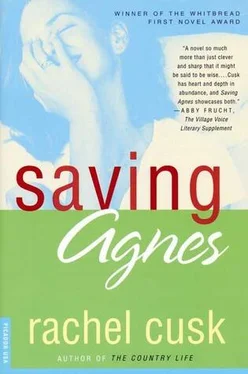‘Excuse me,’ she said politely, approaching him. ‘I’m trying to get home and I don’t seem to have any money. I wonder if you could help me.’
He hesitated momentarily, surprised. She could see him trying to work her out. He looked away and walked past her. The outrage! She stared after him, dumbfounded. As if it wasn’t obvious what kind of person she was! She caught her reflection dimly in one of the steel plates fixed to the wall and was surprised. She looked scruffy and old. It had been a long day. A woman came off the escalator and approached the barriers. Agnes felt her heart swell with relief. She looked kind and would surely be sympathetic.
‘Excuse me—’ she began, before remembering how far this approach had got her last time. The woman had stopped and was looking at her expectantly. ‘Can you spare me some change?’ Agnes blurted out.
The woman immediately looked embarrassed. She sighed and put a hand in her pocket.
‘Oh, all right,’ she said, holding out a ten-pence piece. ‘Although why you people can’t get jobs like everyone else escapes me.’
She clicked smartly off before Agnes had time to respond. So much for change, she thought. Ten pence indeed. Wayne’s mate had been observing her progress and now sauntered over to the ticket barrier.
‘Oi, you,’ he said. ‘Clear off.’
Agnes looked at him with barely disguised distaste. The badge on his lapel read ‘Kevin’.
‘Kevin!’ she said. ‘I might have guessed. How incredibly original.’
A man was approaching from the escalator. He was about her age. He looked like he might understand.
‘I said clear off, you old tart!’ said Kevin.
‘I assure you,’ Agnes replied, ‘there is nothing I would like better. But first I must draw your attention to a certain matter.’ She smiled winningly and pointed at his trousers. ‘Your flies are undone.’
As he looked down, she walked over to the man and stood purposefully in front of him.
‘Excuse me,’ she began.
He looked at her and her heart almost stopped. It was John. His hair a bit longer, perhaps, his clothes different. Something was pounding in her chest.
‘Can I help you?’ he said presently.
Agnes felt faint. He didn’t recognise her, then. She stared at him in silence.
‘Do you need money?’ he said. He delved into a pocket and took out some coins. ‘There. I hope that helps.’
He smiled at her and began walking away. Agnes looked in her hand. He had given her two pounds.
‘Thank you,’ she said.
He stopped and turned around. He looked almost ashamed.
‘It’s the least I can do,’ he said.
AGNES sat at the wooden table in the kitchen of her family home. It was late evening. Outside, against the dark sky, the darker shadows of bats swooped and spun like falling leaves. Agnes’s mother, bare-faced and dressing-gowned, made tea with the air of one rallying round.
‘It’s funny that you’re here,’ she said presently. Agnes did not attempt to deny it. Tom’s coming home tomorrow. You must have smelled trouble with your sixth sense. You always were good at that.’
‘What on earth do you mean?’ said Agnes, aiming for a specific rather than a general explanation of her parent’s meaning. ‘What sort of trouble? What’s happened?’
The house had seemed quiet and strangely unfamiliar when she arrived. They hadn’t been expecting her, and their unpreparedness made her feel as if she had happened unawares upon a secret behind-the-scenes existence; like a restaurant in the early morning, the chairs on tables, the smell of disinfectant, someone pushing a mop around perhaps.
‘He’s lost his job,’ said her mother. ‘They told him a few days ago. For some reason, I thought he’d have told you himself.’
She looked rather flushed with the unexpected responsibility of relaying information of such newsworthiness.
‘Lost his job?’ Agnes was incredulous. ‘But — but how could he? How?’
‘He didn’t just drop it in the street, dear. There is a recession on, after all.’
Agnes’s mother had grown up during the war, and found the vocabulary of that harrowing period indelibly fixed in her memory.
‘Poor Tom. I wonder what he’ll do. God, it seems so unfair.’
‘Life is unfair!’ replied her mother rather shrilly. ‘We’ve always tried to protect you children from disappointment, but I’m afraid we just can’t any more. You have to find out for yourselves what it’s like. Your father and I can’t pick up the pieces whenever things go wrong, you know!’ She went to the sink and turned on a tap. ‘We’re too old.’
She began washing up a teapot. Agnes stared at her dumbfounded.
‘You’re not old,’ she said. ‘And besides, no one’s asking you to pick up the pieces.’ She thought of adding ‘don’t be so melodramatic’ for old times’ sake, but decided against it.
‘Aren’t they?’ sighed her mother. She dried the teapot with a towel which Agnes recognised as one she used to take to the swimming-pool. ‘Well, I don’t know, in that case. I really don’t,’ she insisted. ‘First Tom calls up in a state. Then you arrive on our doorstep looking like death warmed up with heaven knows what problems. What are we expected to do? It’s hard to — to readjust to all this.’
Agnes found this speech rather wounding. While in moments of happiness and high confidence she would not have minded in the least her mother’s retirement from parental services, and indeed would probably have actively encouraged her liberation, her current state of despondency cast a somewhat different light on things. She did not want to hear that her primal protector had been replaced by someone offering tea and limited sympathy. It was not a fair exchange.
‘Well, what did you expect?’ she said crossly. ‘Did you think we’d both be safely ensconced in nice country houses by now having babies?’
‘ I was,’ her mother replied; somewhat cruelly, Agnes thought.
‘Well, I’m sorry we can’t all be like you, then. The fact is, we can’t just stop being your children.’ Such logic, if nothing else, was certainly a throw-back to the old days. ‘You’d hate it if we didn’t run to you with all our problems, Mother,’ she continued with a semblance of maturity. ‘You know you would.’
Her mother smiled wanly and sat down at the table.
‘Yes, you’re probably right. But I must say, it makes a pleasant change to have the temper tantrums oneself occasionally.’
‘That was nothing,’ Agnes returned. ‘You missed out the bit about not asking to be born.’
She grinned edgily. The times when she had sought exemption, immunity — perhaps even grace! — with such claims to innocence were still too fresh in her memory to regard with more than passing irony.
They had to collect Tom from the local station because his company car had been rescinded. Such seizures made Agnes fearful of the brutal arena of office politics. As they swung round the corner to find Tom sitting forlornly on his suitcase in the deserted forecourt, Agnes saw in his destitution evidence of a cruelty she had long suspected lurked behind the civilised façade of corporate life. He had ceased to please them, and they had ejected him from their circle without a thought to loyalty or love. One had to watch one’s back these days, she reminded herself. There were a lot of funny people about.
The car stopped and positions were shifted by silent consensus. Agnes’s father vacated the driver’s seat and removed to the back, where Agnes soon joined him from her earlier place in the front passenger seat, now occupied by her mother. Tom, afforded the rare opportunity to assert himself unchallenged in the family hierarchy behind the driving wheel, now however chose this moment to demur.
Читать дальше












